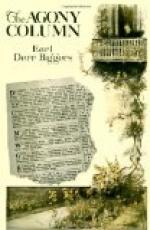“Is Enwright in London to vouch for you?”
“I’m afraid not. I last heard of him in Interlaken.”
“Yes? How did you happen to take rooms in this house?”
“The first time I called to see the captain he had not yet arrived from India. I was looking for lodgings and I took a great fancy to the garden here.”
It sounded silly, put like that. I wasn’t surprised that the inspector eyed me with scorn. But I rather wished he hadn’t.
Bray began to walk about the room, ignoring me.
“White asters; scarab pin; Homburg hat,” he detailed, pausing before the table where those strange exhibits lay.
A constable came forward carrying newspapers in his hand.
“What is it?” Bray asked.
“The Daily Mail, sir,” said the constable. “The issues of July twenty-seventh, twenty-eighth, twenty-ninth and thirtieth.”
Bray took the papers in his hand, glanced at them and tossed them contemptuously into a waste-basket. He turned to Walters.
“Sorry, sir,” said Walters; “but I was so taken aback! Nothing like this has ever happened to me before. I’ll go at once—”
“No,” replied Bray sharply. “Never mind. I’ll attend to it—”
There was a knock at the door. Bray called “Come!” and a slender boy, frail but with a military bearing, entered.
“Hello, Walters!” he said, smiling. “What’s up? I-”
He stopped suddenly as his eyes fell upon the divan where Fraser-Freer lay. In an instant he was at the dead man’s side.
“Stephen!” he cried in anguish.
“Who are you?” demanded the inspector—rather rudely, I thought.
“It’s the captain’s brother, sir,” put in Walters. “Lieutenant Norman Fraser-Freer, of the Royal Fusiliers.”
There fell a silence.
“A great calamity, sir—” began Walters to the boy.
I have rarely seen any one so overcome as young Fraser-Freer. Watching him, it seemed to me that the affection existing between him and the man on the divan must have been a beautiful thing. He turned away from his brother at last, and Walters sought to give him some idea of what had happened.
“You will pardon me, gentlemen,” said the lieutenant. “This has been a terrible shock! I didn’t dream, of course—I just dropped in for a word with—with him. And now—”
We said nothing. We let him apologize, as a true Englishman must, for his public display of emotion.
“I’m sorry,” Bray remarked in a moment, his eyes still shifting about the room—“especially as England may soon have great need of men like the captain. Now, gentlemen, I want to say this: I am the Chief of the Special Branch at the Yard. This is no ordinary murder. For reasons I can not disclose—and, I may add, for the best interests of the empire—news of the captain’s tragic death must be kept for the present out of the newspapers. I mean, of course, the manner of his going. A mere death notice, you understand—the inference being that it was a natural taking off.”




